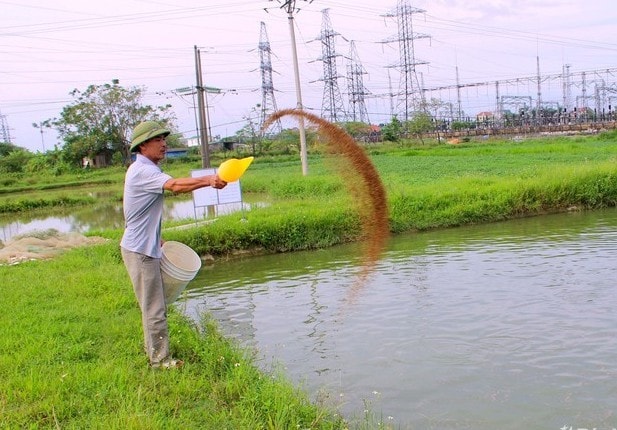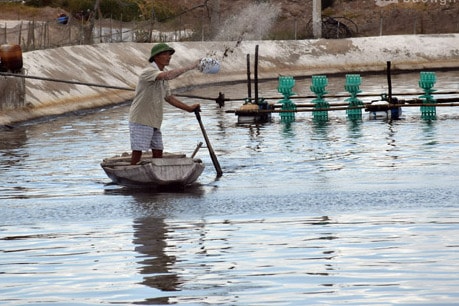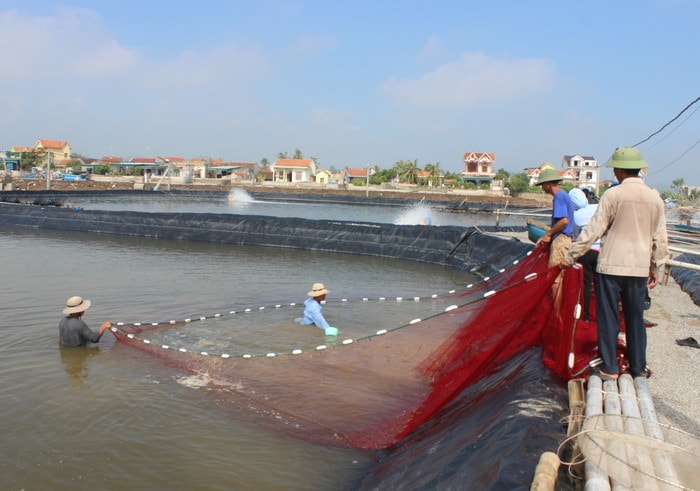How to supplement Vitamin C for shrimp and fish
(Baonghean.vn) -Farmed shrimp and fish often suffer from many diseases due to environmental impacts and nutritional sources. Vitamin C is one of the essential factors supporting shrimp and fish growth.strengthen immunity;essential during the transitional season.
The role of vitamin C
 |
The role of vitamin C in aquaculture is most evident in the synthesis of collagen and some other trace elements. Vitamin C helps shrimp and fish increase immunity, reduce stress, and resist environmental impacts; especially when the weather changes, from spring to summer, from autumn to winter.
Vitamin C also limits the harmful effects of ammonia on the growth rate of shrimp and fish, and reduces the toxic effects of nitrite in intensive aquaculture systems.
In case shrimp and fish get sick due to some agents, vitamin C should also be used to increase resistance when there are signs of illness.
There are two main types: pure vitamin C and commercial vitamin C. When using, farmers need to carefully check the ingredients and C content; depending on the farming conditions and the supply market, farmers should choose appropriately.
Symptoms of vitamin C deficiency in shrimp and fish
Shrimp lacking vitamin C will have black muscle areas under the chitinous shell on the dorsal surface of the abdomen, on the swimming legs, crawling legs and black streaks on the shrimp gills. Black spots can appear in the stomach and intestines. Sick shrimp show signs of anorexia, poor appetite, reduced ability to withstand shock, more sensitive to various secondary pathogens, reduced ability to regenerate wounds, so the recovery process is slow.
Fish lacking vitamin C often show signs of spinal deformities, dorsiflexion and hemorrhages at the base of the fins, around the mouth and eyes; body color turns dark. Sick fish have reduced growth; at the same time, reduced resistance to shock and invasion of pathogens.
Needs and usage mode
 |
Fish and shrimp species all have quantitative vitamin C requirements, depending on a number of factors such as size and growth rate.; farming forms and characteristics of the aquatic environment.
Vitamin C requirements vary depending on the stage of development. In the larval stage, shrimp need to be supplied with more vitamin C than in the adult and parent stages (In the larval stage, giant freshwater prawns need to supplement 200 mg of vitamin C/kg of food, in the juvenile stage, shrimp need to supplement 100 mg/kg of food).
For fish, vitamin C requirements vary by species (carp fry have a vitamin C requirement of 45 mg/kg, while sea bass fry have only 20 mg/kg).
To limit vitamin C loss, farmers must supplement the feed in different forms; vitamin C can be supplemented in microencapsulated feed because the vitamin C content in this form is about 80 - 90% and can be stored for several months.
How to supplement vitamin C
 |
In the composition of synthetic food there is a quantity of synthetic vitamins, but during processing and preservation, vitamin C is lost. If not supplemented, shrimp and fish will get sick.
The amount of vitamin C needed to supplement varies depending on the species and the type of vitamin C.
For shrimp, supplement by dissolving vitamin C in water, sprinkle on food at a dose of 1 kg vitamin C/500 kg of food, mix well; use Binder adhesive to create adhesion and cover the food to help shrimp eat effectively; should be used from the time of releasing Post larvae until harvest.
For fish, dissolve Vitamin C in water and sprinkle it on the food at a dose of 2g vitamin C/kg of food, mix well and use an adhesive to coat the outside, or mix it directly into the food; should be used 3 times/week, from the time of raising to harvest.
The point to note when using vitamin C is not to use it in combination with antibiotics, because vitamin C is an acid, if used with antibiotics it will lose its effect. Currently, in the aquatic medicine market, there are many products that provide vitamin C with different content ratios; Content can be 10%, 15%, 20%, 25% or 30%. The higher the vitamin C content, the lower the supplement dose and vice versa. If the vitamin C content is 20%, the dose for shrimp and fish is about 3 - 6 g/kg of food, and for splashing into the pond is 0.5 - 1 kg/1,000 m3 of water. |
Ngoc Anh
(Synthetic)
| RELATED NEWS |
|---|

